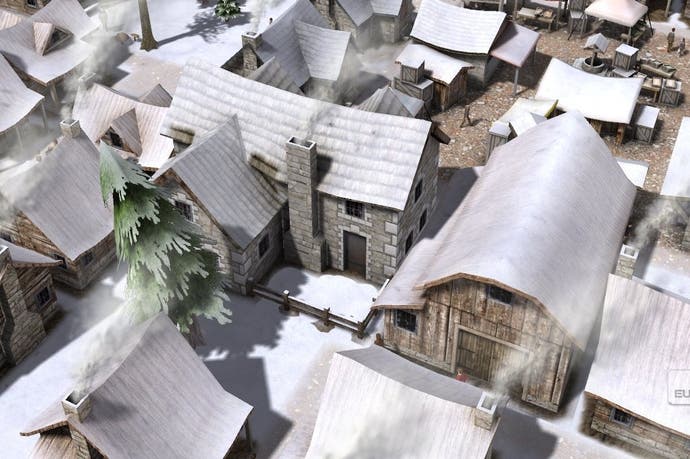Banished review
Craft. Work.
I'll be straight with you here: I'm not sure what I want next in life. I do know that I want more, that I need to keep aspiring to things, and I think life should have its fair share of excitement, of passion, of burning desires and glorious fulfilment. Inside me, very quietly, very determinedly, I strive.
So, philosophically, I'm somewhat at odds with Banished. It's not really a city-building game so much as a village-maintaining game, a game of modesty - even mundanity. Progress is slow, drama is rare and the day-to-day lives of those whose homes you watch over are mostly lives of hardship and hunger.
There are no great goals to work towards; there's no endgame or campaign. There doesn't necessarily need to be, mind, because it's often a struggle just to get by. Banished is a survival sandbox. It's harsh. The reward for success is another year scraping at the earth, chopping firewood or tending a flaming forge. Sometimes, a mother dies in childbirth. So it goes.
Each game begins with a handful of villagers, a limited stock of supplies and seeds, a new procedurally-generated map and a few months before winter sweeps in. Land must be cleared, plots laid out and those first, most critical buildings constructed. Villagers will need homes, they'll need woodcutters to supply kindling, a blacksmith to make them tools, crops to fill their aching bellies. Nobody will ever need or ask for or even dream about any sort of luxury.
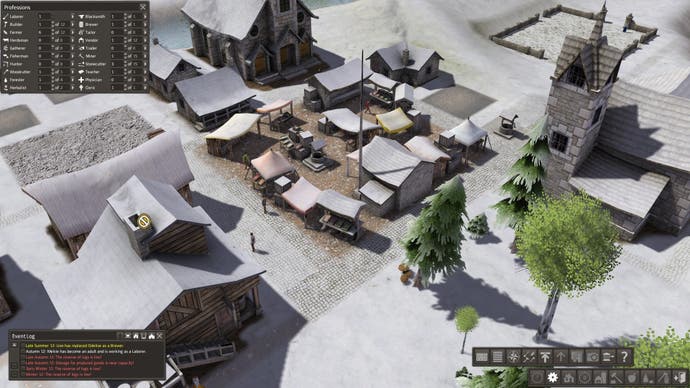
Almost every building you lay down will have a particular role tied to it and it's up to you to assign it villagers. Some, such as the woodcutter, only need one man or woman, but a hunter's lodge, a forester's hut or a farmer's field could be staffed by several, should you choose. With maybe a dozen people at your disposal, these first assignments will have a profound effect on everybody. Fail to make enough firewood and people die. Fail to harvest enough food and people die. As people die, the amount of villagers available who can fill these jobs dwindles. Your tiny economy wilts. People die.
The first time this happens it can be very difficult to grasp why and how things unfolded as they did. The game cloaks itself in a very particular sort of opacity. It's not easy to tell how much food a villager is going to eat or how much firewood they'll burn. While the interface lets you know who is doing what, where or why, seeing the bigger picture, understanding the chains of consequence, is more difficult. Building a town hall gives you access to a few more statistics, but that's a building you'll really have to earn. It comes with time and effort.
Experience brings understanding. Banished is often an exercise in balance and bottlenecks. If foresters don't fell enough trees, the woodcutters making firewood spend time idle, but if your supply of timber overflows, you'd be wise to reassign a forester elsewhere, perhaps to fishing or mining. It's always good to have villagers available for general labour, too. They'll collect and store all the resources you're carefully gathering, as well as step into vacant roles should anyone expire.
Another game might make this a painful exercise in micromanagement, but Banished's villagers are sensible, independent people. They work as hard as they can and, barring accidents, can be trusted to get on with whatever needs doing as long as their needs are met. Once a village is quietly taking care of itself, every precious villager carefully assigned and a surplus of resources growing, you can turn your attention to some very careful, very deliberate expansion.
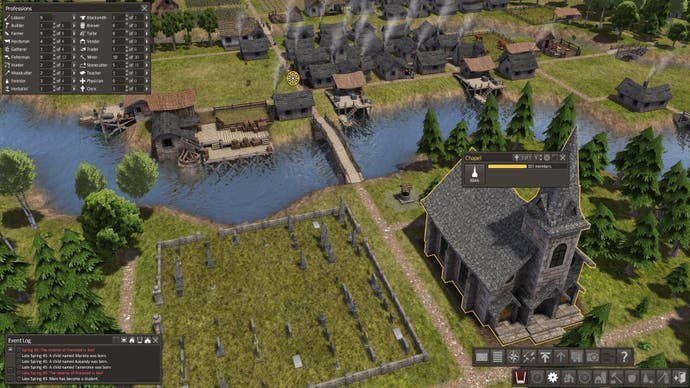
You might be able to pull someone away from one of the most vital jobs and give them a role that contributes in a more removed fashion. A priest in a church or a teacher in a school, perhaps, though sending children to lessons denies you their labour elsewhere. Banished has no tech trees or buildings that need to be unlocked, so from the earliest moments you could ask your villagers to build a great stone church or a sturdy town hall, but these are considerable investments of both time and resources. Plus, nobody can eat a town hall. Throwing villagers and resources into a bigger project too soon guarantees that people will die.
Tailors and traders are a wiser move, the former providing better clothing and the latter giving you a chance to swap surplus resources for different goods, perhaps more livestock or new seeds. You come to see deeper layers of complexity within the game, as you realise that more food types and different clothing make for happier, healthier humans. Even the age of a forest matters, determining the food and herbs found therein.
If progress is slow, so too is change. Consequence can take its sweet time as it ripples through your little villages, its aftershocks felt for many years. Famines that killed a generation of children will have also deprived you of a generation of future workers. Jobs will become vacant. Supplies will need to be stockpiled. Very probably, people will die. In one of my villages, it took me years of game time before I realised I'd lost a whole generation and all that I had left was 20 senior citizens, all too old to breed, all fading away.
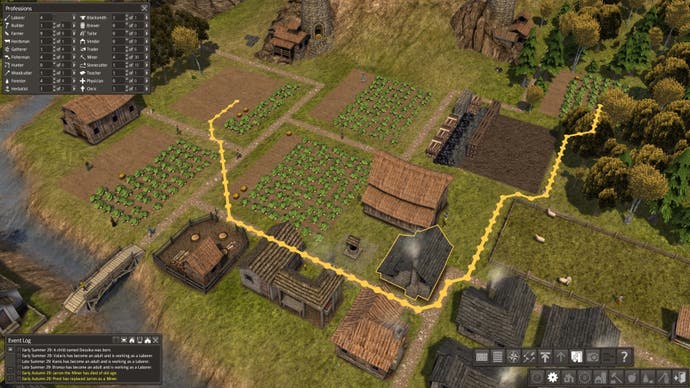
Though ever present, death is only the littlest of dramas. The message log pops up occasional footnotes of fate, letting you know somebody starved, was born, was crushed by a falling rock. Everyone else carries on with their labours in the meantime. Villagers are faceless, featureless and largely interchangeable. The days pass. People die. There is no fanfare. You make sure your stocks are sufficient.
Very, very occasionally, something spectacular can happen. One of my villages was carved asunder by the whirling tail of a tornado that killed 10 and wrecked as many buildings. My population was less than 40, my stockpiles limited. There was no way to come back from this loss and, once again, starvation and ruin came to stay, creeping into each house as the seasons drifted by.
With the possibility of more deaths lying somewhere behind every decision you make, feeding and housing a hundred, maybe two hundred villagers becomes a tremendous achievement and is extremely satisfying. Slow, mindful expansion is the way toward this and your village soon becomes your bonsai tree, carefully tended, never allowed to spread too soon, every imperfection addressed the moment it's found.
So it's a shame these villages don't grow more beautiful with time. Banished forces you to build in a very grid-like fashion and gradually you find you're growing generic, formulaic settlements that lack character. While the homes have many variations, the next village's church will look like the last, one farm or orchard is much like another. Your flat, square creations grow into midwestern suburbs. Your next achievement, after stability, is mediocrity.
"The sort of players likely to appreciate the game's challenge, its depth and its intertwined systems are the same sort of players who are likely to demand a little more from it"
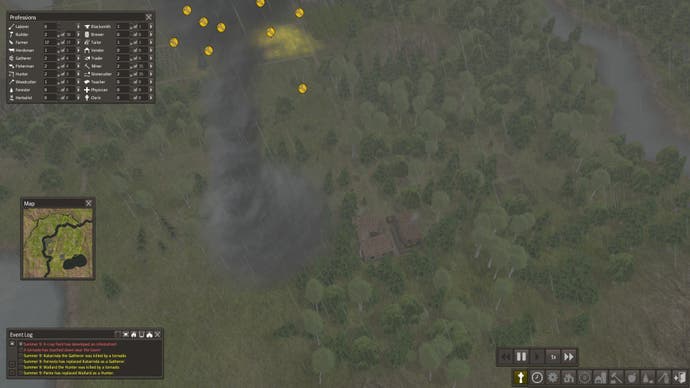
This is where Banished and I have our philosophical differences. I don't mind that it's a hard game, because it's still fair, even if it can be difficult to fathom. I don't mind that it's slow, because it makes progress remarkably rewarding and it serves as a reminder to the gaming generation of the severity of subsistence living. It dispels the illusion of rustic, romantic medieval life, of the bourgeois novelty of poverty.
I do mind that, after maybe a weekend's worth of play, there's nothing else to do with your best village. Banished has complexity and intelligence etched into the gears that grind inside it, but it doesn't have longevity. A safe, stable village is all you can ever really hope to create and, should you want to keep its population growing, you'll only ever be building more farms, more blacksmiths, more houses. When Banished is done being hard, it becomes repetitive, relying on random events to disrupt the status quo.
It's a shame, because the sort of players likely to appreciate the game's challenge, its depth and its intertwined systems are the same sort of players who are likely to demand a little more from it. A campaign mode, specific challenges, more environments or any expansion of scope would be welcome.
I liked playing Banished. It was complex, but never fiddly, difficult, but rarely cruel, though it would benefit from a little more transparency. But as soon as I had a handle on it, as soon as I'd started to see through some of the fog of its complexity, I wanted to grasp for something bigger, something greater. Banished is satisfying, but never spectacular. That's not quite enough for me.
